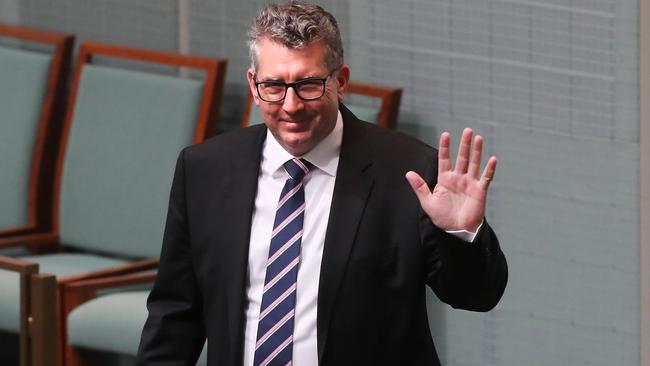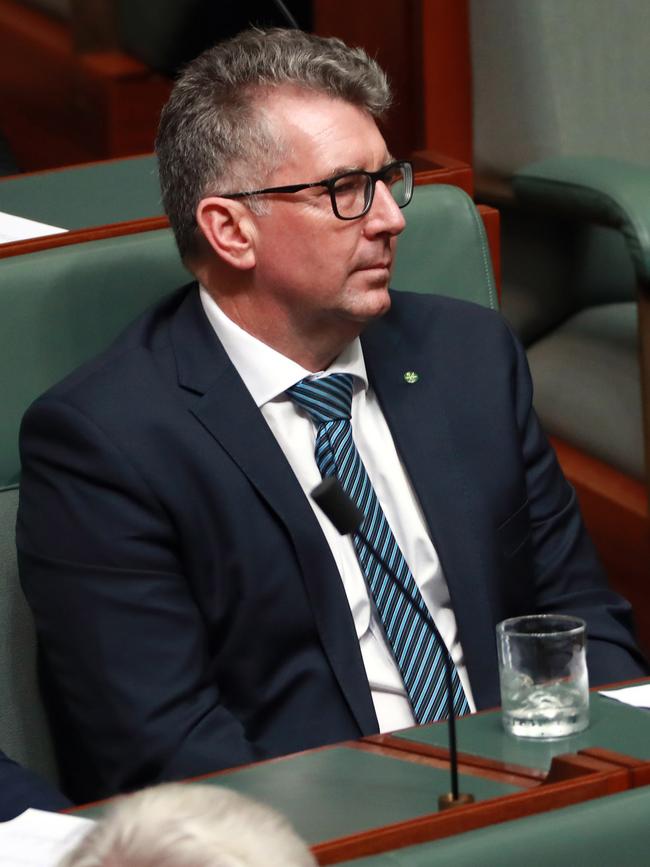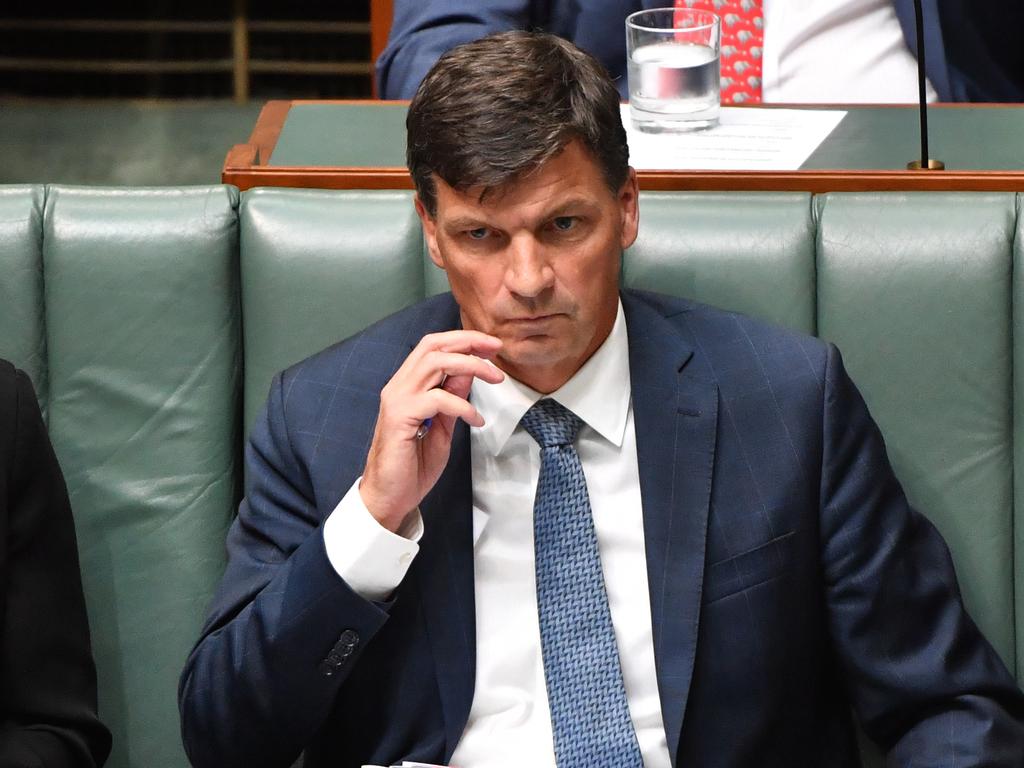Nuclear, Paris and a return to cabinet: Who is Keith Pitt?
One of the big winners from the cabinet reshuffle, where does the Queensland Nationals MP sit on energy policy and climate change?

Queensland Nationals MP Keith Pitt, one of the government’s most outspoken advocates for nuclear power who previously quit the frontbench over his opposition to the Paris Agreement, has been catapulted from the backbench into cabinet as Resources Minister.
The 50-year-old former sugar cane farmer will also take over as Northern Australia and Water Minister, raising questions over how he will balance the interests of the mining and water industries.
First elected in 2013 as the member for Hinkler, Mr Pitt has served as assistant minister to the deputy prime minister under both former Nationals leader Barnaby Joyce and his successor Michael McCormack.
He was also assistant minister for trade, tourism and investment for just over a year.
Mr Pitt quit as assistant minister in August 2018 in opposition to the government’s commitment to reducing emissions by 26-28 per cent by 2030 under the Paris accord.
“I will always put the national interest and the interests of my constituents above my own. I will always put reducing power prices, before Paris,” he said at the time.
Born and raised in Bundaberg, Mr Pitt is married to wife Allison and has three children, Liam, Ruby and Elisabeth.
He was one of four members in the House of Representatives to oppose legislation to legalise gay marriage.
Mr Pitt once described solar and batteries as this generation’s potential “asbestos” and was one of the key drivers behind the most recent parliamentary inquiry into nuclear, which last year recommended the government consider adding the energy technology to its future energy mix.

Opposition climate change and energy spokesman Mark Butler demanded Scott Morrison tell Australians “which regions are in his nuclear firing line” following Mr Pitt’s appointment to the resources portfolio.
“The new Minister for Resources and Water, Keith Pitt, is the government’s biggest advocate for nuclear power and a dedicated opponent to global action on climate change through the Paris Agreement,” Mr Butler said.
“Keith Pitt’s appointment to the crucial resources portfolio is also another signal that Scott Morrison is walking even further away from action on climate change.”
The Prime Minister said the government had been clear there needed to be bipartisanship on nuclear “to be able to move forward”.
The Murray-Darling Basin, whose plan Mr Pitt is now responsible for, does not run through his electorate, which has been seized on by critics and supporters of the Nationals MP.
“It’s good that new water minister Keith Pitt’s electorate is outside the Murray-Darling Basin,” South Australian Centre Alliance senator Rex Patrick said.
“The MDB must be managed in the national interest, not just the interests of large upstream irrigators.”
South Australian Greens senator Sarah Hanson-Young tweeted: “Another Queensland National’s politician given the job of Water Minister. RIP the Murray-Darling Basin.”
Mr Pitt has worked as an electrical apprentice, tradesman, engineer and farmer and in 2002 started the Australian Safety and Training Alliance, which teaches workplace health and safety courses.
Keith Pitt on …
Same-sex marriage
Mr Pitt was one of four MPs that voted against same sex marriage.
Speaking at the time, he said: “I did not support the legislation because I believe it does not adequately address the concerns of many in my electorate around religious freedoms, parental choice and the right for parents to raise their children as they see fit.”
However, Mr Pitt’s vote was at odds with his electorate of Hinkler that ultimately voted ‘yes’ in the postal survey.
Mr Pitt told parliament he found himself in a challenging position because there were only 1101 votes separating yes (40,649) from no (39,548) in his seat.
Paris Agreement
In August 2018, Mr Pitt resigned from the assistant ministry in protest over Australia’s participation in global action on climate change.
“I have today advised the Deputy Prime Minister and Prime Minister of my decision to resign from the ministry. It has been a great privilege to serve the Australian people, particularly in a role which delivers much needed infrastructure to the regions. However, I will always put the national interest and the interests of my constituents above my own. I will always put reducing power prices, before Paris.”
Nuclear
Mr Pitt has long argued for the government to consider nuclear energy and in July 2019, he called for an “adult conversation” on the issue.
“Unless you’ve been living under a rock, you would have heard the discussions around nuclear energy once again being put forward in the media and other places,” he said. “Once again I say to those opposite, to those who are here in the room: we are looking for an adult conversation on a difficult issue. However, in Queensland we know the state Labor government is unable to do that.
“In fact, Minister Dick came out last week and talked about three-headed turtles, about glowing animals and all sorts of things. I’d say to the minister: spend less time watching The Simpsons and more time informing yourself.”
A month later, following the launch of a parliamentary inquiry into nuclear power, Mr Pitt said:
“Australia is one of the few developed nations which is not using nuclear as an energy source, yet we mine uranium here and send it overseas. It’s not just about looking at whether nuclear could be an affordable, reliable power source with virtually no emissions, it could be a new strand to the economy with fabrication, reprocessing, mining and exporting of uranium.”
Coal
In December 2018, Mr Pitt posted a video to his Twitter account of him standing before an anti-coal protest in the marble foyer of Parliament House.
It was accompanied by the statement: “Coal means jobs. Australian resources provide jobs for tens of thousands of Australians, particularly in the regions.”
Solar
“As an electrical engineer I can tell you solar panels don’t work in the dark,” Mr Pitt told the ABC in July 2019. “We can’t have the entire Australian economy be reliant on the weather. Otherwise you’d only be working between 11am and 3pm in the afternoon if it’s just on solar. You won’t do anything in the dark.”
In June 2019, Mr Pitt told The Guardian solar and batteries had the potential to be this generation’s “asbestos.”
“We have got a real risk particularly with solar panels and lithium batteries that they could turn out to be this generation’s asbestos.”
Politics
In March 2018, Mr Pitt offered some insight into his views on politics.
“I don’t work on the set of Days of Our Lives. This is a serious building where serious decisions are made. We continue to be focused on that, and for me it’s about jobs, it’s about driving the economy, it’s about growth, particularly in regional areas, and the delivery of infrastructure.”
Climate Change
In October last year Mr Pitt addressed the issue of climate change, arguing that the government should consider alternative power forms such as nuclear energy and HELE coal fire power as part of its emissions reduction efforts.
“If those opposite were serious about this, if it is a climate emergency, then everything should be on the table — everything — and we shouldn’t just be ruling things in and out because we like them or we don’t like them. That means that you should consider nuclear energy. That means that you should consider HELE coal. If a HELE coal power station can reduce emissions by 40 per cent, why wouldn’t you use it? Why wouldn’t we go to another country and take their biggest emitting industries and move them to Australia, cut them in half, improve the world’s outcome and create more jobs? But it seems that’s off the table too.”
At the same time, Mr Pitt asked climate activist group Extinction Rebellion to put forward a “practical approach” to climate change rather than gluing themselves to buildings.
“I’d say to those in Extinction Rebellion: there will be no glue for you if there is a climate emergency; we simply can’t produce any. Every single time we bring forward stunts like this, you depreciate the value of your position. If you really want to support climate change work and what we are doing around the environment, put forward a practical approach. Tell us what it is.”




To join the conversation, please log in. Don't have an account? Register
Join the conversation, you are commenting as Logout